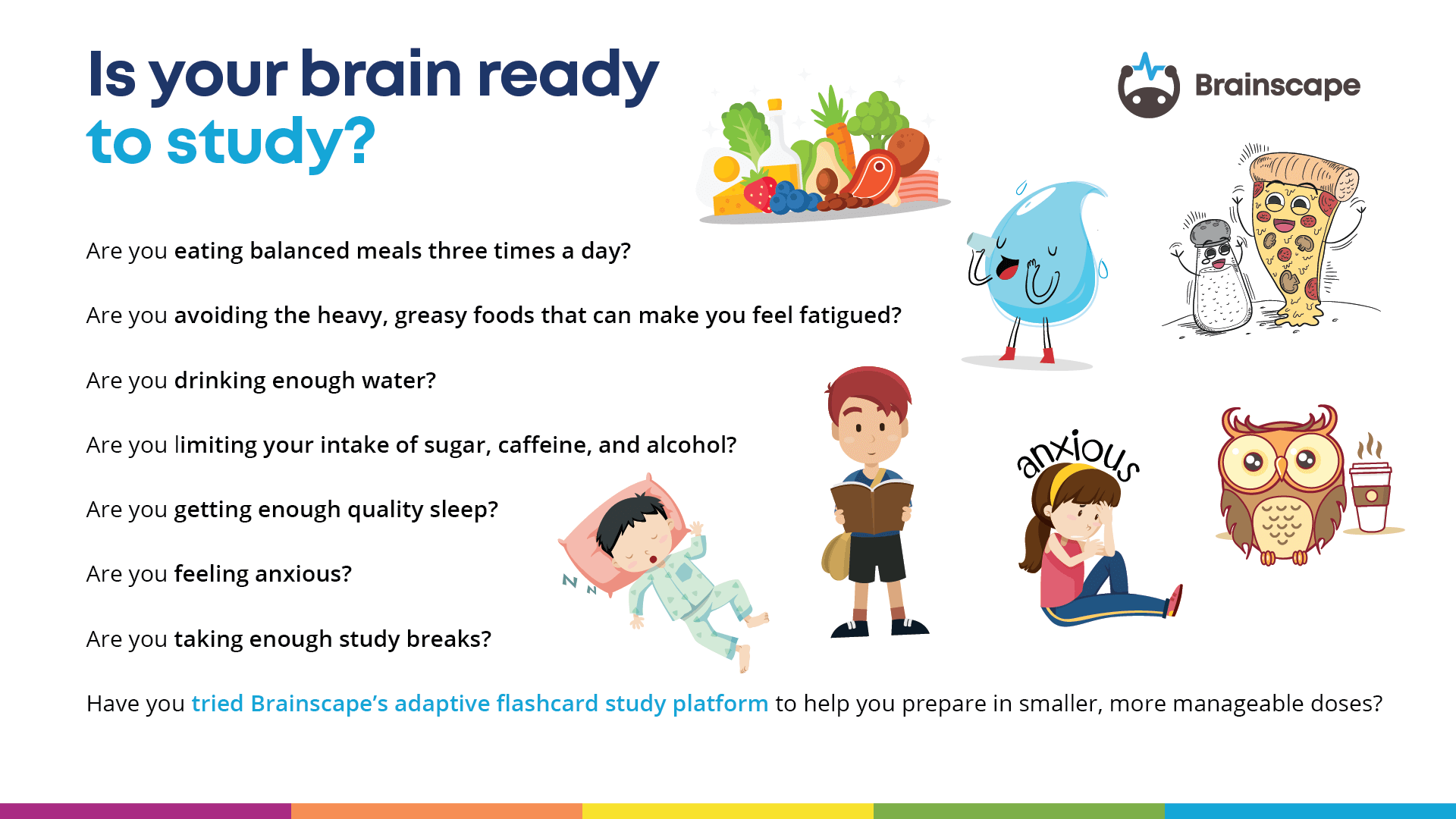“The MCAT’s easy!” said literally nobody, ever. Actually, the MCAT is incredibly overwhelming with a ton of science content to memorize and fundamental critical thinking and reasoning skills to master. In fact, studying for this exam is a full-time job: the outcome of which determines your very future as a medical healthcare professional.
Yeah, so MCAT stress, fear, anxiety, and overwhelm are a thing!
Previously we talked about the basics of setting up an MCAT study group, taking an MCAT practice test to get the most out of it, and developing an MCAT study plan (or at least using Brainscape's free, customizable MCAT study planners and exam countdown sheets). But honestly, even with the best group, plenty of practice, and the clearest plan, you can find yourself starting to feel really swamped.
But, don’t fear! Brainscape is here with some excellent advice on dealing with MCAT anxiety!
We're the developers of the world's most effective flashcard app, and our team of MCAT flashcard authors has over 50 combined years in MCAT tutoring. As a team, we are fascinated by the learning process and the study techniques that help students excel. That naturally includes managing MCAT overwhelm and optimizing your learning.
So what is the key to managing MCAT stress?
Well, it really helps to remember that fear and stress are nothing more than physiological processes—they are grounded in your body. So, in order, to manage stress, you’ve got to manage your body. Let's dive into some tips ...
Tip 1: Managing MCAT stress through diet and exercise

Start with the fundamentals: diet and exercise.
Too many students fall into the trap of defaulting to quick, easy fast foods, overdoing the caffeinated beverages (because they’re trying to maintain focus for 10 hours a day), and forgetting to drink enough water. And forget about exercise! Who has time for the gym when the biggest exam of your life is right around the corner?
This couldn’t be further from the truth.
Your body is a machine that requires adequate fuel and hydration in order to function well. And “function well” includes pretty important tasks like learning new information and remembering it. When it comes to diet, you don’t need to do anything too fancy. Just stick to Michael Pollan’s simple seven-word mantra: “Eat food; not too much; mostly plants".
(For an even deeper dive on how to optimize your brain health for studying through diet, hydration, sleep, and exercise, check out our awesome Academy guide.)
Then, getting at least half an hour of aerobic exercise every day has been shown to have all sorts of benefits for your brain’s cognitive functioning. Don’t try to do more than two or three hours of uninterrupted study at a time. After that period, you need to get up, move around, and give your brain a rest.
[Don't think you have time to balance studying and exercise? Think again! Here's how to study while exercising!]
Tip 2: Avoiding MCAT overwhelm by eliminating distractions
One of the major sources of MCAT stress is feeling like you’re not accomplishing anything, despite spending what seems like thousands of hours with your butt in the chair. To that end, you need to make sure that when you sit down to study, you’re actually studying productively and not checking your phone, browsing through Facebook, or examining your cuticles.
Put your phone on silent and leave it in another room. Wear earplugs, headphones, or noise-blocking earmuffs. Ask (beg) your roommates or family to give you space and be quiet during your study sessions—anything that will help you stay focused and on task. Also, check out ‘How to avoid distractions during MCAT study’, which contains fantastic advice on hacking your environment for productivity.
[Brainscape's certified MCAT flashcards will help you sneak in super-efficient study sessions throughout the day; anytime and anywhere you go. Check them out.]
Tip 3: Squashing MCAT fear by learning from your practice tests (rather than freaking out)
The final major source of MCAT fear for most students is practice tests. It’s easy to freak out if you score unexpectedly low, especially if the real MCAT is right around the corner.
Normally, when a student reviews an exam, there’s a tendency to skim past the questions they got right, and then to slow down and obsess over the questions they got wrong. When students are asked to “select ten questions from each section of the test to review in class” they will, without fail, select only the questions that they got wrong. This makes sense from a learning point of view, but it has the definite side-effect of creating MCAT stress.
To help combat this and bolster MCAT mojo and morale, students should do the opposite of their usual approach. The assignment is simple: take and review a full-length practice MCAT, but review BOTH the wrong and the right answers. In fact, this is fundamental for your preparation. Reviewing the right answers reinforces what you do know, while also making sure you didn’t get the answer right “by accident” or through luck.
When you do review a correct answer, make sure you congratulate yourself: Focus on why you got it right, and how you’ll get questions like that right in the future. By doing this kind of “positive review” of a test, you can help maintain a focus on success that leads to confidence. Confidence that can then, in turn, banish your MCAT anxiety and the stress it brings.
Also remember: the whole point of doing MCAT practice tests is to LEARN. And so it doesn’t matter what you score, as long as you learn as much as you possibly can.
Want to better understand the goal posts? Check out our article: 'What is a good MCAT score?'
Tip 4: Managing MCAT stress with meditation or yoga
You should strongly consider a routine habit of meditation, yoga, or some other way to effectively manage your MCAT stress. Research has shown that both meditation and yoga have major positive benefits. These both also help you develop stronger focus, so they'll serve you well in medical school, too.
Choosing a stress management technique that works for you is an essential life skill as an aspiring doctor so the sooner you get into the habit, the better!
Tip 5: Make a plan
Creating an MCAT study strategy helps you take the work you need to do and break it down into achievable daily goals. By then writing these goals down in an MCAT study planner, you totally eliminate the anxiety of "Am I covering enough of what I need to?" because you can clearly see your path through all of that study and practice to the final goal of confidently walking into the exam.
Don't forget to use Brainscape's customizable MCAT study schedules and MCAT
countdown planners to help you lay out those micro-steps!
What's next? The application process
Lastly, remember that MCAT fear or stress can actually be a good thing. It can help to motivate you to actually put in the work to ace the MCAT. For more advice on this, check out what you can do to use exam stress to actually improve performance. Also, check out the following essential MCAT guides and use Brainscape’s certified MCAT flashcards to rise to your challenge!
